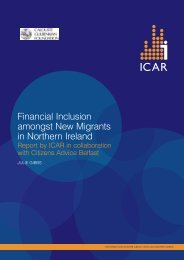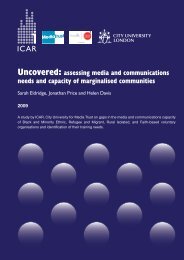The Somali community in the UK: What we know and how we ... - ICAR
The Somali community in the UK: What we know and how we ... - ICAR
The Somali community in the UK: What we know and how we ... - ICAR
You also want an ePaper? Increase the reach of your titles
YUMPU automatically turns print PDFs into web optimized ePapers that Google loves.
social parameters” is detrimental to education <strong>and</strong><br />
employment, a dra<strong>in</strong> on <strong>in</strong>come, <strong>and</strong> destructive of<br />
family relationships. In addition:<br />
Excessive khat use is also associated <strong>in</strong><br />
some cases [with] psychotic disorders,<br />
paranoia, <strong>and</strong> halluc<strong>in</strong>ation, which can<br />
lead to cl<strong>in</strong>ical depression <strong>and</strong> mental<br />
health problems, particularly <strong>in</strong> those<br />
who have experienced <strong>the</strong> trauma of<br />
civil war. (ibid)<br />
A recent development is <strong>the</strong> <strong>in</strong>creas<strong>in</strong>g use of<br />
khat by women, who rarely chew <strong>in</strong> <strong>Somali</strong>a.<br />
<strong>Somali</strong>s suggest that this is connected to <strong>the</strong> high<br />
proportion of s<strong>in</strong>gle mo<strong>the</strong>rs <strong>in</strong> <strong>the</strong> <strong>community</strong><br />
who feel trapped by poverty <strong>and</strong> social isolation<br />
<strong>and</strong> seek <strong>the</strong> company of o<strong>the</strong>r women. But <strong>the</strong>y<br />
also allude to <strong>the</strong> <strong>in</strong>creas<strong>in</strong>g freedom of women<br />
<strong>and</strong> <strong>the</strong>ir new <strong>in</strong>dependence from men <strong>in</strong> <strong>the</strong><br />
chang<strong>in</strong>g circumstances of <strong>the</strong> <strong>UK</strong>.<br />
Women <strong>and</strong> gender roles<br />
I remember liv<strong>in</strong>g a medium life. Me,<br />
my husb<strong>and</strong> <strong>and</strong> eight children. I<br />
remember my baby call<strong>in</strong>g, “Mama,<br />
mama”. Quite normal.… But <strong>the</strong> war<br />
breaks. We fled. Far away to south<br />
<strong>Somali</strong>a....Two months on. Everyth<strong>in</strong>g’s<br />
out of h<strong>and</strong>. We run away from <strong>the</strong><br />
civil war. Me, my husb<strong>and</strong> <strong>and</strong> eight<br />
children.… And <strong>we</strong> go from <strong>Somali</strong>a<br />
by boat towards Kenya. But suddenly<br />
<strong>the</strong> boat is s<strong>in</strong>k<strong>in</strong>g. <strong>The</strong> boat is<br />
overloaded…. <strong>The</strong> boat broke. Water<br />
break<strong>in</strong>g <strong>in</strong>to us…. I can’t swim. <strong>The</strong><br />
boat s<strong>in</strong>ks. Who will rescue us?....<br />
200 people are dy<strong>in</strong>g, drown<strong>in</strong>g. I’m<br />
los<strong>in</strong>g my family to <strong>the</strong> sea. Five of my<br />
daughters are lost…. And my eldest<br />
son, he’s just begun his life, he’s f<strong>in</strong>ished<br />
university. He’s lost. That makes six of<br />
my children. Dead <strong>in</strong> <strong>the</strong> sea, <strong>in</strong> one<br />
day.… Suddenly, an Italian tourist boat<br />
is pass<strong>in</strong>g.… people come to rescue us.<br />
<strong>The</strong>y grab my baby, who I’m hold<strong>in</strong>g.<br />
And ano<strong>the</strong>r child of m<strong>in</strong>e…. All <strong>the</strong><br />
time my baby’s call<strong>in</strong>g “Mama, mama.”<br />
Suddenly, I am hauled <strong>in</strong>to <strong>the</strong> boat like<br />
a baby myself…. I am cry<strong>in</strong>g. My whole<br />
body. Cry<strong>in</strong>g.… Do you hear me?…<br />
I cannot forget that day. Although<br />
I’m here before you today, you can’t<br />
have imag<strong>in</strong>ed <strong>the</strong> life of one <strong>Somali</strong><br />
woman.… am break<strong>in</strong>g my silence.<br />
<strong>The</strong> world should <strong>know</strong> my life, my<br />
baby call<strong>in</strong>g “Mama, mama”. <strong>The</strong> world<br />
should hear this life.<br />
Quadra was not <strong>the</strong>re herself to tell her story<br />
<strong>in</strong> <strong>the</strong> small Soho <strong>the</strong>atre where <strong>Somali</strong> women<br />
<strong>we</strong>re Break<strong>in</strong>g <strong>the</strong> silence <strong>in</strong> June 2003. She found<br />
it too pa<strong>in</strong>ful to be present, <strong>and</strong> a friend spoke<br />
her words on her behalf. 128 O<strong>the</strong>r testimonies<br />
of war - suffer<strong>in</strong>g hunger <strong>and</strong> violence, witness<strong>in</strong>g<br />
rape, torture <strong>and</strong> death, surviv<strong>in</strong>g flight <strong>and</strong> refugee<br />
camps - <strong>we</strong>re recounted by <strong>the</strong> performers. <strong>Somali</strong><br />
is an oral culture - storytell<strong>in</strong>g was once part<br />
of everyday life, <strong>and</strong> it is from <strong>Somali</strong> women’s<br />
personal accounts that <strong>we</strong> have <strong>the</strong> most vivid<br />
pictures of <strong>Somali</strong> experience. 129 Hav<strong>in</strong>g less of a<br />
public voice than men, women are eloquent on <strong>the</strong><br />
events of <strong>the</strong>ir lives.<br />
<strong>The</strong> ten women on <strong>the</strong> platform <strong>we</strong>re of all<br />
ages - from a great-gr<strong>and</strong>mo<strong>the</strong>r to schoolgirls -<br />
represent<strong>in</strong>g different stages of immigration. Older<br />
women who arrived <strong>in</strong> <strong>the</strong> <strong>UK</strong> before Quadra had<br />
a more benign experience of arrival. In <strong>the</strong> early<br />
days, <strong>Somali</strong> seamen, lodg<strong>in</strong>g <strong>in</strong> port areas s<strong>in</strong>ce<br />
<strong>the</strong> n<strong>in</strong>eteenth century, left <strong>the</strong>ir wives with k<strong>in</strong><br />
at home to br<strong>in</strong>g up <strong>the</strong> children <strong>and</strong> tend <strong>the</strong><br />
herds <strong>in</strong> what was <strong>the</strong>n <strong>the</strong> British protectorate<br />
of nor<strong>the</strong>rn <strong>Somali</strong>a. Many <strong>Somali</strong>s had also been<br />
liv<strong>in</strong>g <strong>in</strong> Aden, where British ships would dock,<br />
but <strong>in</strong> 1967 <strong>the</strong> country ga<strong>in</strong>ed its <strong>in</strong>dependence<br />
128. Page 8 of Break<strong>in</strong>g <strong>the</strong> silence script, k<strong>in</strong>dly given to me by Ruqia<br />
Hersi.<br />
129. For two o<strong>the</strong>r collections of short testimonies by women, see <strong>Somali</strong><br />
Women’s Association (1987/8) <strong>and</strong> Hassan (2000). Secondary sources<br />
consulted for this section <strong>in</strong>clude: Ali (2001); Berns McGown (1999); Castley<br />
(1991); Cox (2003); Dirie (1998); El-Solh (1993a; 1993b); Farah <strong>and</strong> Smith<br />
(1999); Griffiths (2002); Harper-Bulman (1997); Polese (2001); Sales &<br />
Gregory (1996); Summerfield (1993).<br />
<strong>The</strong> <strong>Somali</strong> <strong>community</strong> <strong>in</strong> <strong>the</strong> <strong>UK</strong><br />
59

















